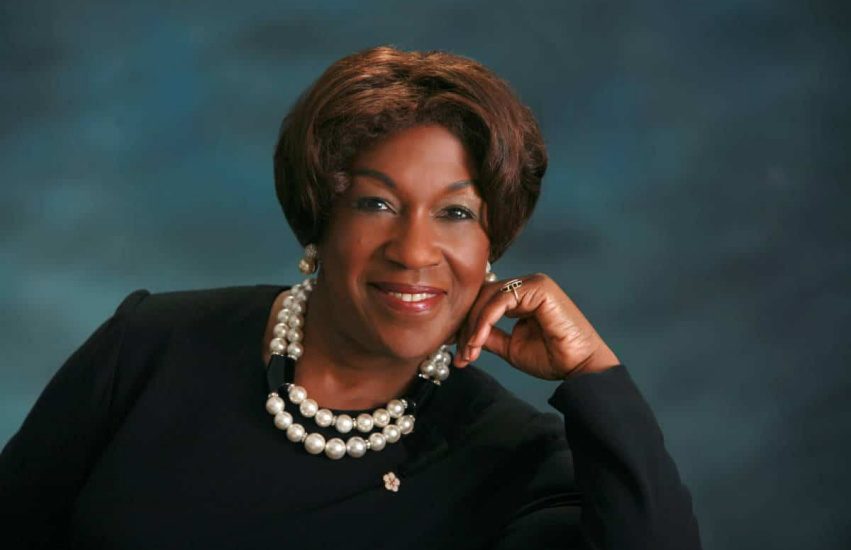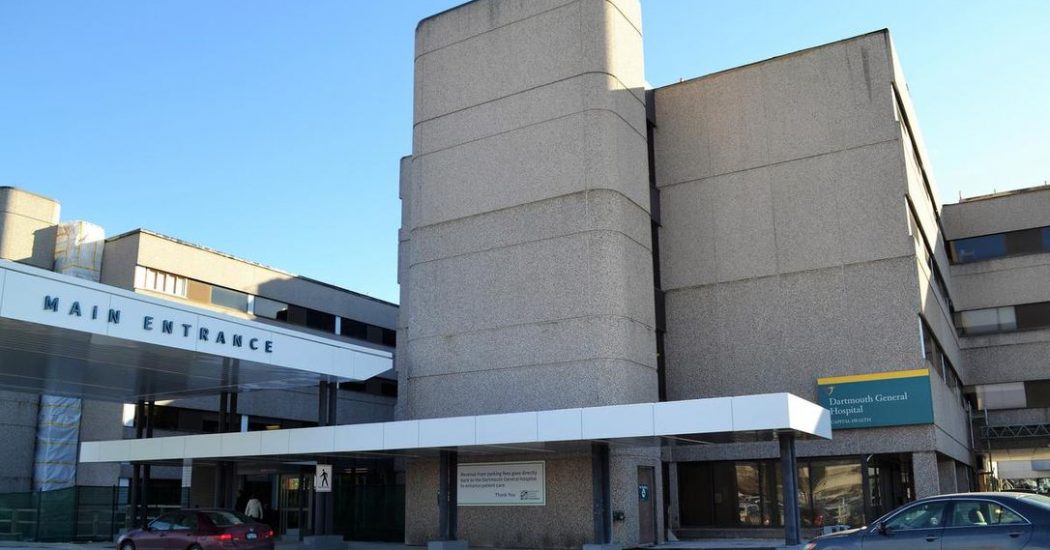
KJIPUKTUK (Halifax) – Earlier this year Dr. Mayann Francis had an encounter with staff of the Dartmouth General Hospital that she experienced as racist in nature. Francis was the 31st lieutenant-governor of Nova Scotia and the first Black person to hold that position.
Unable to get a meaningful response to her complaint from the Nova Scotia Health Authority, Francis has filed a complaint with the Nova Scotia Human Rights Commission, an organization she once headed.
What happened to Francis within the health system is in many ways similar to what African Nova Scotian activist Lynn Jones encountered on a trip to the QEII emergency department, as we reported last month.
This is what happened.
Mayann Francis, recovering from an operation and still in pain, was visited by a physiotherapist who, without permission, started reading the cards attached to the flowers in her room.
“Are you a doctor,” the physiotherapist asked. Francis told her she wasn’t, and explained that she had received several honorary doctorates.
“How come,” was her next question. “Because I was the Nova Scotia Lieutenant Governor,” a humiliated Mayann Francis responded.
“Here you are, a patient, you’re in pain, and you’re being questioned and quizzed like that. She had no business reading my personal cards, that was totally inappropriate. But then to continue to ask these questions. When I told her that I wasn’t a doctor, that should have been the end of it. Why was she questioning me? Is it because I was a Black woman and she saw my title there, and wondered how can that be? ” Francis asks.
While recuperating at home Francis was unable to put the encounter out of her mind.
“This is not something I want anybody to go through. How many other people have gone through something similar, maybe something worse? You have to question what impact that has, especially as somebody who’s Black and you’ve been through this all your life,” says Francis.
However, raising the issue with the Nova Scotia Health Authority (NSHA) bureaucracy was challenging.
Mayann Francis never received a response to an email she sent to then CEO Janet Knox. And when later she talked over the phone with several people at the Health Authority, Francis could never shake the feeling that the bureaucrats weren’t getting it.
“I had to explain that racist behaviour is not only calling somebody the the N-word or blatantly doing something racist. There is unconscious bias, there’s micro-aggression. This would fall into that category, apart from the fact that she should never been reading those cards in the first place,” Francis says.
The physiotherapist, a contract worker rather than a regular employee, apologized (although not in person), and when Francis kept asking questions of the NSHA, was shown a documentary about unconscious bias, but without any sort of meaningful follow up.
“My whole thing about racism and discrimination is that it is about education and about dialogue,” says Francis. “And you need to have two people to have that conversation. And so clearly to me, the expert wasn’t sitting there with her. What did she learn?”
Further meetings between Francis and staff ensued, and management wrote two letters of apology. But still what appeared to be missing was a clear commitment to change.
“That second letter was about all the good things they were doing. But the issue isn’t about what you’re doing, it’s about the results. How are you measuring? How successful is it?” Francis says.
After that second letter Mayann Francis filed a formal complaint with the Nova Scotia Human Rights Commission, which is now investigating.
Francis believes that the initial encounter, but also the non-response from the CEO, the inability of staff to recognize the racist nature of the incident, and a lack of commitment to make structural changes, left her no choice.
“Even now, when I have to go into a hospital, I wonder if I am going to run into anything. I mean, that’s your life as a Black person, you always wonder about that,” Francis says.
“My goal is about the bigger picture and the long term. Not everybody’s going to have the courage to speak up. Whether it’s about racism, or sexism, or ableism, it’s all on the same pathway. I recognize that change takes time, but what do you have in place that’s going to make it move along?”
The NSHA responds
Much like when we wrote about the incident that involved Lynn Jones, the Nova Scotia Health Authority points to a list of measures such as ongoing cultural competence training and education for staff and volunteers, and mentions its efforts to engage vulnerable populations in health services planning.

“As we mentioned recently, we strive to be patient-focused and do not tolerate any form of discrimination in our facilities. We have apologized to Dr. Francis and are following up on her concerns,” writes spokesperson Carla Adams on behalf of the NSHA.
“We know lots of work remains, but we are making progress as we work towards reducing health inequities and supporting our workforce to respect and value diversity and social inclusion. We’ve provided many examples of the work underway in collaboration with the community, including the hiring of an African Nova Scotian Services Consultant,” Adams writes.
“Beyond this, we cannot comment on a complaint that is currently under investigation by the human rights commission.”
“Racism is often is a factor when Black people interact with institutions in Nova Scotia”
For context we talked with Sharon Davis-Murdoch, co-president of the Health Association of African Canadians (HAAC). HAAC advocates for a healthcare system without barriers for Black Nova Scotians. Davis-Murdoch is also on the board of the Dartmouth General Hospital Foundation.
I was curious about what would make a hospital like the Dartmouth General a more welcoming place for African Nova Scotians, keeping in mind that it is the closest hospital for residents of East and North Preston, Canada’s largest, longest-standing Black settlement.
Davis-Murdoch was unfamiliar with the actual incident, but she was willing to speak in more general terms.
“I would say that is really important is that people come forward and share their experiences, good and bad, because we do not have data, we are not able specifically to speak about numbers of times that these things happen, but anecdotally we know that they do happen,” Davis-Murdoch says.
It is clear that racism is often is a factor when Black people interact with institutions in Nova Scotia, she says, pointing to the findings of the Home for Colored Children inquiry released last week as just the most recent example.
“There has always been racism here in Nova Scotia. There is no question that understanding this is necessary in order to provide good and culturally competent care,” says Davis-Murdoch.
This is so even when white people might want to shrug such an incident off as a case of over-sensitivity.
“Sometimes people are not able to put themselves in the place of someone of African ancestry, because they have not experienced a lifetime of microaggressions. A history that has told them as Black people that they are somehow inferior. If your lived experience is one in which systemic racism is a fact of your daily life, your response to negative behaviour is a response that comes out of a knowledge of that experience,” Murdoch-Davis says.
That understanding for Murdoch-Davis is part and parcel of the cultural competency training HAAC is a proponent of.
“To my mind, cultural competence is about understanding the history and lived experience of the people that we serve and the people that we work with in the health system,” she says.
One person who has thought and written a lot about implicit bias, how to recognize it in yourself and how to address it, is Dr. David Williams, Murdoch-Davis says. Williams visited Nova Scotia at the invitation of HAAC, and the organization’s website features several videos of him.
There is one more thing Murdoch-Davis wants to say about Dr. Francis speaking out about her encounter, just as Lynn Jones did just weeks earlier.
“What to me is so striking is that these outstanding women both referenced the importance of learning from their experience, so other people can benefit from a better system,” says Murdoch-Davis.
“It’s that collectivist thinking that is so remarkable about our people. It isn’t just about the individual, but it’s about the impact on our communities. I think that is very admirable, and it makes me very proud.”
See also: Dr. Lynn Jones: Going to the ER while Black
See also: Open letter to the Premier: Seven actions to stop systemic racism in our health care system
With a special thanks to our generous donors who make publication of the Nova Scotia Advocate possible.
Subscribe to the Nova Scotia Advocate weekly digest and never miss an article again. It’s free!



